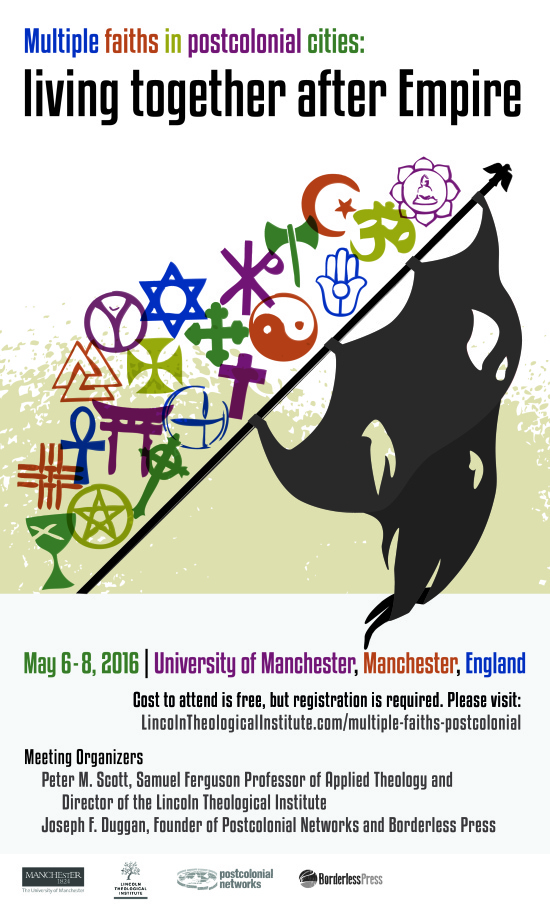DIVINITY AFTER EMPIRE:
MULTIPLE FAITHS IN POSTCOLONIAL CITIES:
Living together after Empire
An International Conference, 6 - 8 May 2016
Welcome to the conference webpage!
All the essential information will be posted here as it becomes available so please check back regularly.
Attendance at the conference is free but registration is required and should be completed at the Registration Page .
The conference will run from after lunch on Friday 6th May 2016 until lunch on Sunday 8th May and will be held in Ellen Wilkinson Building C1.18, University of Manchester, Oxford Road, Manchester, Greater Manchester, M13 9PL. The Ellen Wilkinson Building is no.77 on the Campus Map.
A full programme for the event is available here.
For a list of nearby accommodation please click here.
Live streaming will be available for some parts of the conference at this link (flash player required).
For general enquiries regarding the conference please contact Jonathan Dunn at jonathan.dunn@postgrad.manchester.ac.uk
Alternatively, if your enquiry is in relation to a visa letter please contact Chloe Mcevoy at chloe.mcevoy-4@manchester.ac.uk
Presenters and Papers:
“Multifaith Space: religious accommodation in postcolonial public space?” by Terry Biddington, Co-ordinating and Anglican Chaplain at St Peter's House (Manchester Higher Education Community: UoM, MMU, RNCM)
"Yato Mat Tato Path: Ramakrishna and the Construction of a Multi-Religious (Post)Colonial Calcutta" by Saugata Bhaduri, Professor of English, Jawaharlal Nehru University (New Delhi, India)
"A Postcolonial Ethnographic Reading of Migrant Faith Communities in Bangalore" by David Joy, Professor of New Testament, United Theological College (Bangalore, India)
"Becoming Park Rangers: living together as people of multiple faiths" by Helena Mary Kettleborough, Manchester Metropolitan University, Phil Barton and Elaine Bishop, Becoming Park Rangers Project (Rusholme, Manchester) As part of this paper, there will be a visit to the New Apostolic Church, only a mile or so from the conference location, to hear stories ‘on the ground’ from local residents.
"The Jamia Experiment: Religion and ‘Living Together’ in Postcolonial Delhi" by Simi Malhotra, Professor of English, Jamia Millia Islamia (New Delhi, India)
"Worshipping God in the edges of the city: The case of African Israel Nineveh Church (AINC) in Nairobi city with Bishop Jane Akoth" by Professor Esther Mombo and Heleen Joziasse, St. Paul’s University (Kenya)
"An Indian Theological Hearing on Subalternity" by Raj Patta, PhD Student, Lincoln Theological Institute, University of Manchester
"Migrant Imaginaries of the Religious Self, and Other: A Postcolonial Perspective on Religion and Migration" by Federico Settler, Lecturer in Sociology of African Religions, University of KwaZulu-Natal (Durban, South Africa)
"Remembering together: Commemoration and public theology in Northern Ireland" by Jonathan Dunn, PhD Student, Lincoln Theological Institute, University of Manchester

Colonial powers bring their religion with them and often this religion becomes an instrument of rule. When empires fall, the residue of imperial suspicion lingers. When colonial powers beat a retreat, older religious resentments and new tensions may emerge. We hear daily news reports in cities around the world about violent clashes between Christians and Muslims, Buddhists and Muslims, Shia and Sunnis, Catholics and Protestants and more. Why have we not as frequently heard of postcolonial cities where people of multiple faiths peacefully coexist? How do people of goodwill organize for cities based on multiplicity of identities, languages, religions, and shared public space? What role do theologians and theorists have in fostering collaborative spaces for faith communities to coexist in ways that work for justice for all people? How are the misuses of religion addressed? How do our religions and theologies need to change to foster people of multiple faiths living side by side after empire?
Multiple faiths in postcolonial cities: living together after Empire
______________________________________________________________________________________
For several decades, postcolonial scholarship has flourished in the fields of the study of literature, cultural theory, history and even biblical studies. However, the impact on theology has been weaker. As R.S. Sugirtharajah noted in 2004: "European colonialism has never been a popular subject for theological inquiry in Western discourse despite the very substantial links between the churches of Britain and the missions of the colonial world."
The series of events, below, thereby seeks to fill a significant gap in the scholarly discussion/literature.
- DaE, 4th international conference 28-30 May, 2014: Limuru, Kenya. The Postcolonial Church: Theology, Identity and Mission. Conference Host: Esther Mombo, St Paul's University. A call for papers can be found here.
- DaE, 3rd international conference Story Weaving: Colonial Contexts and Postcolonial Theology. 24-26 January, 2012, Melbourne, Australia. Host: Mark Brett.
- DaE, 2nd international conference, January 2010, United Theological Seminary, Bangalore The papers from this conference have been published as Decolonizing the Body of Christ: Theology and Theory After Empire (ed. David Joy and Joseph Duggan, Palgrave Macmillan, 2012)

- DaE, 1st international conference, Church, Identities and Post/colonialism - 1st-2nd May, 2008, University of Manchester
Other Postcolonial Networks meetings:
- 20-22 October, 2010, Postcolonial Roundtable, Gordon College, Massachusetts, USA
- 28-29 October, 2010, Atlanta, Georgia, USA Society of Anglican and Lutheran Theologians
- Anglican Identities and the Postcolonial - 21 July, 2008, Lambeth
Check out:
Further information:
Please contact Dr. Joseph Duggan at nyclaman@googlemail.com. For Dr. Duggan's biography, please click here.
